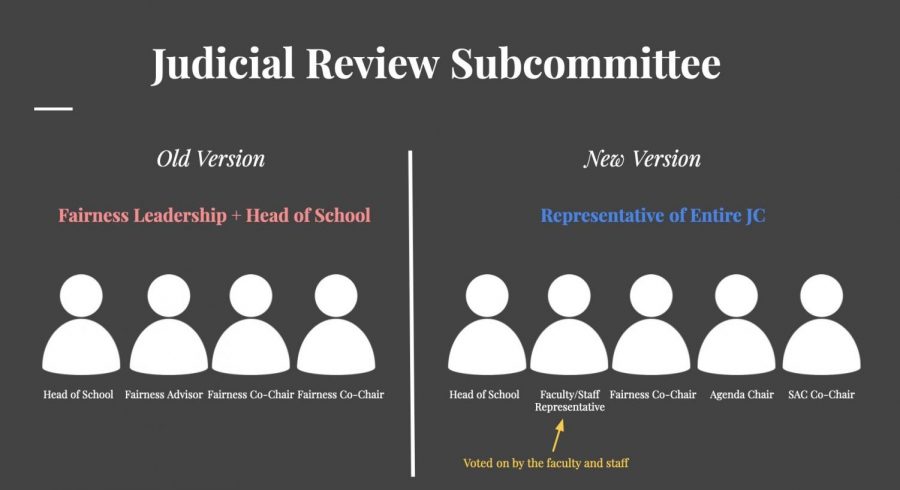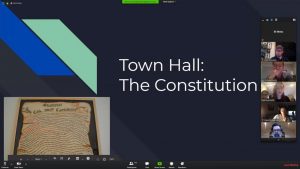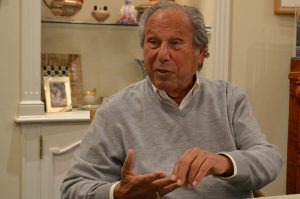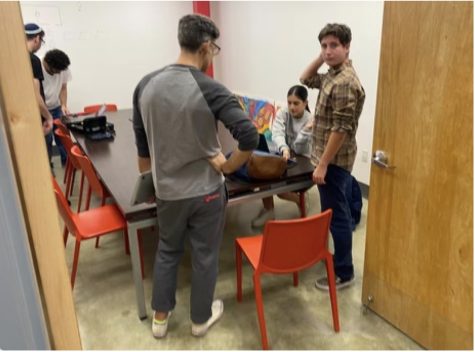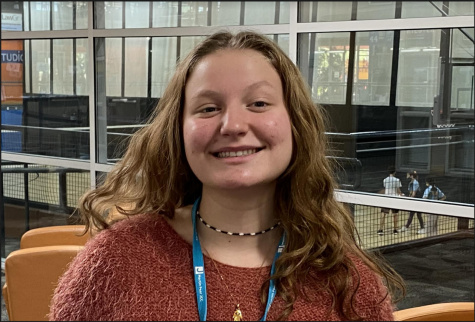Constitution vote, set for Friday, may turn on whether new document gives students more or less influence than original
‘Amended’ framework also defines school values and says ‘Judicial Review’ subcommittee must defend proposal vetoes at Town Hall
Graphic by Evan Rubel and David Edwards
BROADER: Framers of the new constitution proposal this week changed the membership of the Judicial Review Subcommittee they are proposing. Along with the Head of School, it now includes leaders of Fairness and Agenda and an elected faculty representative, instead of just Fairness co-chairs and the Fairness Adviser.
After weeks of debate over whether a newly proposed constitution would give students more or less power than they have now, the Shalhevet community is scheduled to decide by the end of the week whether or not to approve the biggest change to the Just Community framework since the constitution was first ratified in 2002.
The authors of the constitution said they aim for the Just Community to vote on the proposed constitution by the end of the week, ideally by Friday. A two-thirds vote will be required for approval, and a quorum — a minimum number of votes for the election to be valid — will not be required.
Written by seniors David Edwards, Evan Rubel and Sabrina Jahan and debated at two “constitutional convention” workshops earlier this year and two Town Halls so far, the document is being presented as an amendment — not a replacement — for the current constitution, which in recent years has not been fully in use.
A third Town Hall is scheduled for Zoom tonight at 7:30.
The newly amended constitution would give students “the ability to participate in a democracy and to allow them to think critically, discover their voice, and develop morally to one day participate in an actual one,” said David, who has been Agenda Chair this year.
“That’s the whole idea of our Just Community,” David said.
The most contested change proposed has been the addition of a new body called the Judicial Review Subcommittee, which would decide whether or not a proposal was constitutional and may come to Town Hall for an official discussion and vote.
Any proposal it approved would be debated and voted on by the entire community, and the vote would be binding — meaning that school administration could not veto it. This was a key improvement sought by the seniors working on the document, who cited examples of Town Hall votes in recent years that the administration had called “advisory.”
“A few years ago, some people wanted to run a feminine product drive for underprivileged women, but the admin shot it down,” said said Evan Rubel, who is outgoing co-of the Fairness Committee. “There have been dress code proposals that have been modified based on pressure from the admin.”
Also right now, either the Agenda Committee or even its faculty adviser can unilaterally decide that a proposal should not be considered. That has been a regular occurrence in recent years, according to students whose proposals have never been discussed.
The current, original constitution gives the Agenda Committee full power to decide what is brought to Town Hall. Under the proposed new constitution, that power would be divided among members of Judicial Review.
Judicial Review would be made up of the Agenda chair; one co-chair of the Fairness Committee; one co-chair of the Student Activities Committee (SAC); an elected member of the faculty; and the Head of School.
However, for a proposal to be approved for Town Hall consideration, all five members of the new committee would have to agree unanimously. Because the Head of School is a voting member, this in effect would give the administration veto power in advance, since any one dissenter — including the head of school — could stop the proposal from going to Town Hall for a binding vote.
If the new committee is unable to unanimously agree, the proposal would go to a public forum automatically anyway, though only for discussion, not a binding vote. Judicial Review would then reconsider it, and if it still couldn’t come to a unanimous decision, the proposal would go “to the Agenda Committee or the Fairness Committee for further revision or examination,” the proposed new constitution states.
“For a proposal to be vetoed, there has to be clear reasoning as to why it should be vetoed, and that reasoning is clearly outlined in the constitution,” said Sabrina Jahan.
“They [the Judicial Review Subcommittee] can’t just sit back and say, ‘I don’t like this proposal — therefore I’m going to veto it,’ but they have to actually have a reason with which they can say this proposal needs to be vetoed. It contributes to ensuring that a unanimous vote occurs more easily as well.”
Those opposing the new document said unanimity would be hard to achieve, especially amongst both students and faculty. People also worried this could create an endless cycle of going to Town Hall and then back to the Judicial Review Subcommittee.
Kate Orlanski, who was elected last Friday to be next year’s Agenda Chair, told the Boiling Point the proposed constitution still takes away power from the student body, because the constitution would be creating a subcommittee whose sole purpose would be to determine if proposals should be vetoed or not.
“Once the student body has publicly defended their reasons for passing any sort of proposal, it makes it a lot harder for the administration to go and veto it after the fact,” said Kate.
“Now, [we would be] creating a committee and every single proposal would be shown to the committee and they would just be asked ‘Do you want to veto this?’ And that makes it a lot easier for the administration to veto things.”
Further, she said she thought the proposed constitution would take power away from the students because the students wouldn’t get to discuss proposals prior to them being rejected.
“The administration or whoever is on the Judicial Review Committee — which includes the head of school — can just veto proposals before the student body even gets to hear about them which I find to be limiting to the students’ power,” Kate said.
As stated in the original constitution, before proposals go to Town Hall, they go to the Agenda committee where Agenda can either return it to the author for revision, bring it to smaller-group Community Forums to formally submit for a Town Hall discussion, be rejected if it goes “beyond the bounds of democracy,” sent to the Judicial Review Committee, or brought straight to Town Hall.
The Judicial Review Committee in the original constitution had its own chair and positions, and only met when Agenda wanted it to check whether a proposal was constitutional. The proposed Judicial Review Subcommittee, on the other hand, would check all proposals and have members from other committees and parts of the JC.
With the proposed constitution, any proposal can be rejected by the Judicial Review Subcommittee if it violates the values outlined in the constitution preamble.
Responding to Kate, David Edwards said the Judicial Review Committee would give more power to the students because otherwise a proposal could be approved by students and then vetoed by the administration, whereas with the proposed constitution, whatever the students vote on is immediately written into the Student Handbook.
Although there is no mention of an administration veto in the current constitution, according to Evan Rubel, it “became acceptable after the constitution fell out of use and was lost.”
David also said the Judicial Review Committee, with three student members, would be deciding whether a proposal is constitutional or not — something the administration in recent years have been doing.
“It’s much more power to the students because all the different parts of the JC are coming together in that little organ and are simply deciding the constitutionality,” said David.
“Of course there will still be disagreements and debates about the actual proposal in Town Hall,” David said, “This is simply making sure there is never an administrational veto.”
The current Just Community constitution has a clause under the Agenda Committee description that says, “The committee shall have the power to ask for, accept, reject, and edit proposals from the community.”
According to David, the Agenda Committee rejected two proposals this past year on “halakhic grounds.” Further, he said there were four proposals that were never voted on because the changes they would be making were “so miniscule.”
Thus, with the current system, proposals can be rejected without ever going to Town Hall, just as they might be with the passing of the proposed constitution. With the proposed constitution, however, the Judicial Review Subcommittee can only reject proposals if they believe it undermines the values of Shalhevet, as explicitly described in the preamble of the proposed new constitution.
Those values, it states, are “Torah, Halakha, Menschlichkeit, and Zionism, as well as the democratic values of liberty, equality, and justice for ourselves and for posterity, while recognizing the value of learning through growth, the necessity to create civically responsible citizens, the need for respectful dialogue in any community, and the importance of thinking deeply and critically about our world.”
Further, David said if the Judicial Review Subcommittee were to reject a proposal and people disagreed with their decision, Agenda could still bring it to town hall for discussion.
“I would love for there to be a case where Judicial Review strikes down a proposal bc its unconstitutional or maybe goes against the values of the school, and for Agenda to bring that whole case to Town Hall,” David said, “and for everyone to talk about the reason why something was struck down — about the values of the school — and maybe in that moment, realize the values of the school have changed and someone can submit an amendment to the coniston and change it.”
Other changes contemplated in the new constitution concern the roles of the Fairness and Student Activities Committees.
The old constitution states that all Fairness Committee meetings must be closed and private. But in January, the entire student body was taken to Fairness over allegations of classroom vandalism and was never even informed. Instead, Fairness co-chairs asked grade-level representatives to represent the community, and thus Fairness members were the only students who attended the meeting.
That case was decided in favor of the faculty, and Fairness ruled that students should be locked out of classrooms during lunchtime and free periods for two weeks as an incentive to treat rooms with more respect.
According to Evan, this was against the original constitution, but happened because the JC constitution was not fully active at the time. If a situation like this were to occur in the future, he said, it would be enforced properly because the community would be more committed to a constitution they had just voted on.
In that case, any parties involved in a case would have to be given knowledge of it and invited to attend the meetings.
The proposed constitution also creates the possibility of smaller, temporary committees called councils, which would be created by any “member, organized group, or entity of or within the Just Community,” and would set up on an as-needed basis to resolve short-term issues like revising the chesed policy or managing JC elections.
Also different in the new constitution would be the addition of the Student Activities Committee as an official branch of the Just Community.
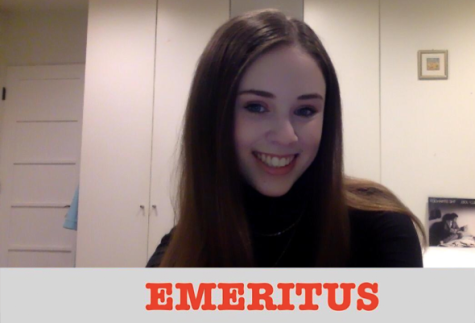
Molly is studying at Midreshet Torah v'Avodah seminary in Jerusalem and will attend Columbia University in New York next year.

